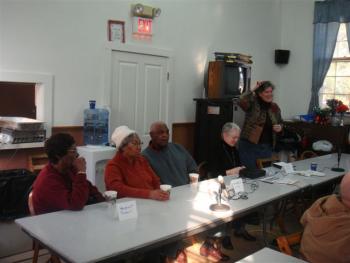Shuckers' Tales

New Jersey’s Delaware Bayshore
The Bayshore Center at Bivalve’s Oral History program is dedicated to preserving the oral history and culture of New Jersey’s Bayshore region by saving for posterity the oral histories and material culture connected with the Bayshore region, by creating a repository of recordings and data that can be used for research, by preserving, treasuring and celebrating the environment, history and culture of the Bayshore region and by sharing the heritage of the Bayshore region today and with future generations through program related activities serving visitors, students and scholars.
National Capital Contracting
The Oyster Shuckers, a group of individuals from the Bayshore area, share a rich heritage rooted in the maritime traditions of Port Norris, New Jersey. Their lives are interwoven with the rhythms of the Delaware Bay, where generations have toiled in the pursuit of harvesting and processing oysters. These men and women come from diverse backgrounds, each carrying personal histories that reflect the broader narrative of the oyster industry. Their work began in the early 20th century, with some starting as young as their teenage years, learning the intricate skill of shucking oysters from seasoned veterans. The shuckers' days were long and arduous, spent at the shucking houses where they meticulously opened shell after shell, often singing to maintain morale and camaraderie amidst the demanding work. Their hands, marked by scars and calluses, are a testament to the physical nature of their occupation. Despite the challenges, there was a sense of pride and community among the shuckers, who shared not only the workspace but also the daily experiences of life in a bustling industry that was once the economic heartbeat of their coastal towns.
Scope and Content Note
Seven local citizens of Port Norris, New Jersey, shared their stories about their lives and jobs as shuckers in the various packing houses in Maurice River, Bivalve, Shellpile, Port Norris, and Mauricetown, New Jersey. The panelists include Georgia Robinson, Florence Robinson, Freddie Smith, Beryl Whittington, Margaret Towner, Anna Young, and Sandra King. They describe how they shucked oysters using either the stabbing or cracking methods, what they were paid, and their living and working conditions. The program includes audience participation with questions and answers from the panel. The location was the John Wesley Methodist Church, Port Norris, New Jersey. Their conversation provides a comprehensive account of the oyster shucking industry as remembered by those who experienced it firsthand. The interviewees, a group of former oyster shuckers, recount their personal journeys within the industry, detailing the process of shucking oysters, the working conditions they endured, and the community they formed. They discuss the various sizes of oysters, the origins, and the relationships between shucking houses, as well as the familial ties that often brought them into the industry. The conversation delves into the seasonal nature of the work, the living conditions, and the transportation methods to and from the shucking houses. The shuckers also reflect on the camaraderie and the role of singing in lifting spirits during long workdays. The content further explores the technical aspects of the job, including the tools and techniques used, the payment systems, and the role of the union in negotiating working hours and pay scales. The shuckers share anecdotes about finding pearls, the competition among workers, and the sorting of oysters by size. The narrative captures the multicultural environment of the shucking houses, where diverse races and ethnicities worked side by side. The collection also touches on the decline of the industry and its impact on the workers and their communities.
Please Note: The oral histories in this collection are protected by copyright and have been created for educational, research and personal use as described by the Fair Use Doctrine in the U.S. Copyright law. Please reach out Voices@noaa.gov to let us know how these interviews are being used in your research, project, exhibit, etc. The Voices staff can help provide other useful resources related to your inquiry.
The NOAA mission is to understand and predict changes in climate, weather, oceans, and coasts, to share that knowledge and information with others, and to conserve and manage coastal and marine ecosystems and resources. The Voices Oral History Archives offers public access to a wide range of accounts, including historical materials that are products of their particular times, and may contain offensive language or negative stereotypes.
Voices Oral History Archives does not verify the accuracy of materials submitted to us. The opinions expressed in the interviews are those of the interviewee only. The interviews here have been made available to the public only after the interviewer has confirmed that they have obtained consent.
